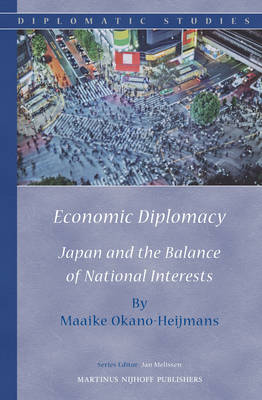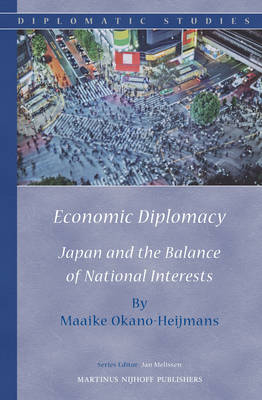
- Afhalen na 1 uur in een winkel met voorraad
- Gratis thuislevering in België vanaf € 30
- Ruim aanbod met 7 miljoen producten
- Afhalen na 1 uur in een winkel met voorraad
- Gratis thuislevering in België vanaf € 30
- Ruim aanbod met 7 miljoen producten
Zoeken
€ 215,45
+ 430 punten
Omschrijving
This book by Maaike Okano-Heijmans makes an important contribution to the concept of economic diplomacy.
A conceptual-study mode of economic diplomacy is combined with applied analysis of Japan's economic diplomacy practice. The two approaches reinforce one another, yielding a conceptualization of economic diplomacy that is grounded in practical insights.
A comprehensive approach
A core argument in the book is that economic diplomacy, strategically, affirms that economic/commercial interests and political interests reinforce one another and should thus be seen in tandem. This contrasts with the predominant approach in the transatlantic world, which attaches relatively greater importance to the military-economic linkage in the quest for influence.
The case of Japan
Japan has employed economic diplomacy as a central instrument of its foreign policy and quest for national security since the post-war period. The reconfiguration of regional and global power that started in the 1990s encouraged the Japanese government, in coordination and cooperation with the private sector, to reassess its economic diplomacy policy.
Power shifts
Economic Diplomacy: Japan and the Balance of National Interests illuminates the debates underlying these shifts, the various ways by which Japan's reinvention of its economic diplomacy is implemented, and the consequences for Japanese foreign policy at large.
Practical relevance
The critical insights offered by the examination of Japan are pertinent for Western countries, as well as for other East Asian nations. They will be of interest to scholars and practitioners of diplomacy, international relations and international economic law and policy.
This book is the ninth volume in the Diplomatic Studies series, edited by Jan Melissen and published by Brill, Martinus Nijhoff Publishers.
For more information see brill.com/economic-diplomacy-0.
A conceptual-study mode of economic diplomacy is combined with applied analysis of Japan's economic diplomacy practice. The two approaches reinforce one another, yielding a conceptualization of economic diplomacy that is grounded in practical insights.
A comprehensive approach
A core argument in the book is that economic diplomacy, strategically, affirms that economic/commercial interests and political interests reinforce one another and should thus be seen in tandem. This contrasts with the predominant approach in the transatlantic world, which attaches relatively greater importance to the military-economic linkage in the quest for influence.
The case of Japan
Japan has employed economic diplomacy as a central instrument of its foreign policy and quest for national security since the post-war period. The reconfiguration of regional and global power that started in the 1990s encouraged the Japanese government, in coordination and cooperation with the private sector, to reassess its economic diplomacy policy.
Power shifts
Economic Diplomacy: Japan and the Balance of National Interests illuminates the debates underlying these shifts, the various ways by which Japan's reinvention of its economic diplomacy is implemented, and the consequences for Japanese foreign policy at large.
Practical relevance
The critical insights offered by the examination of Japan are pertinent for Western countries, as well as for other East Asian nations. They will be of interest to scholars and practitioners of diplomacy, international relations and international economic law and policy.
This book is the ninth volume in the Diplomatic Studies series, edited by Jan Melissen and published by Brill, Martinus Nijhoff Publishers.
For more information see brill.com/economic-diplomacy-0.
Specificaties
Betrokkenen
- Auteur(s):
- Uitgeverij:
Inhoud
- Aantal bladzijden:
- 232
- Taal:
- Engels
- Reeks:
- Reeksnummer:
- nr. 9
Eigenschappen
- Productcode (EAN):
- 9789004255425
- Verschijningsdatum:
- 9/07/2013
- Uitvoering:
- Hardcover
- Formaat:
- Genaaid
- Afmetingen:
- 160 mm x 239 mm
- Gewicht:
- 498 g

Alleen bij Standaard Boekhandel
+ 430 punten op je klantenkaart van Standaard Boekhandel
Beoordelingen
We publiceren alleen reviews die voldoen aan de voorwaarden voor reviews. Bekijk onze voorwaarden voor reviews.








